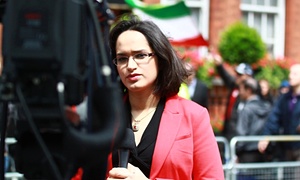January 22-2016

A BBC Persian journalist has apparently become the first Iranian living in Europe to be caught by the new law barring visa-free entry to the United States by dual nationals from Iran, Sudan, Iraq or Syria.
Rana Rahimpour, 33, a British-Iranian newscaster at the BBC’s Persian service based in London, was stopped at Heath-row Airport Tuesday as she sought to fly to New York.
She was told she could no longer fly to the US under the visa waiver program because of her Iranian citizenship. She told The Guardian she was stopped from boarding along with two relatives who are also dual nationals of Britain and Iran.
The law does not apply to Americans who are also nationals of Iran, Iraq, Syria or Sudan. Nor does it apply to Canadians with such dual nationality; they enter the US under a program that applies only to Canadians. Nor does it apply to about 160 other countries whose nationals already require a visa to enter the United States. But it does apply to nationals of 38 countries—mostly in Europe—who are allowed to enter the United States without a visa to visit, but not to conduct business, for up to 90 days,
Those dual nationals—of Iran, Iraq, Sudan or Syria and of one of the 38 countries in the visa-free entry program—now must apply for tourist visas like the nationals of most countries in the world.
Rahimpour told The Guardian she was “devastated” because she was planning to see her brother after a year-and-a-half and was to attend a surprise birthday party. Rahimpour posted a photo of herself sobbing next to her two-year-old daughter, writing: “My fully British daughter can’t attend her American cousin’s birthday [because] her mum was born in Iran.”
Rahimpour’s case is especially interesting because Iran has been extremely hostile toward the BBC Persian service staff, often even their family members still living in Iran. Because of her work at the BBC, Rahimpour said she has not been able to visit Iran for more than seven years.
She said she felt unwelcome in the US after being prevented from traveling, although this does not mean she will be denied a visa. “I just feel it’s unfair; it’s unfair to many Iranians,” she said. “My cousins who were traveling with me and faced similar problems left Iran 20 years ago. They don’t know how to write or read Farsi and they are paying the price for the politics of a country that they have nothing to do with.”
Rahimpour told The Guardian the US risked alienating many Iranians, and was sending a mixed message. “Iranians feel they are being treated very unjustly…. They have said that there has never been a terrorist attack by an Iranian national on American soil. This is very unfair. They referred to the nationality of those involved in 9/11, and you can’t find any Iranians involved.”
She was blocked from going to the US the day after three Iranian-American dual nationals were freed by Iran after the United States in effect paid to win their freedom from an Iranian prison.
The legislation has angered many Iranian-Americans, including Dr. Firouz Naderi, the NASA official who ran the program landing spacecraft on Mars. He told The Guardian recently that he now feels he is being treated as a second-class citizen in the country he calls home—although the legislation doesn’t apply to him or any other Iranian-Americans. And he said he told that recently to First Lady Michelle Obama on meeting her at the White House.











